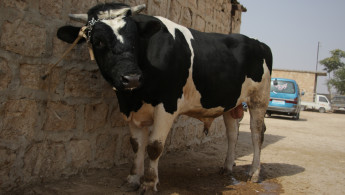Syria's White Helmets pull off elaborate rescue of cow trapped in deep ravine
The Syrian Civil Defence, also known as the ‘White Helmets’, shared a video on Thursday of its elaborate mission to rescue a cow that had fallen into a 30-metre-deep ravine in Idlib province, northwestern Syria.
The animal was trapped in the deep, rocky gulf for more than 10 hours before being it was lifted out, the White Helmets said in the caption for the video they shared on their Facebook account.
The rescue was met with celebration by the cow's owner, who relies entirely on the animal for their source of income, the volunteer group said.
“When we found out what had happened to the cow we headed straight there," rescue mission participant Bana Bahri told The New Arab’s sister site, Al-Araby Al-Jadeed.
"We were amazed at just how deep it had fallen - 30 metres down. Twenty metres of that was muddy slope, and 10 metres was sheer cliffs," Bahri said. “The stony gorge is near impossible to access, and it keeps going down for another 200 metres”.
The cow was in urgent need of food by the time rescuers were able to bring nourishment down.
Once the cow was fed, the mission to free it began in earnest.
“We decided to start by digging out the muddy slopes and building a wooden bridge for the cow to walk up," Bahri said.
More than 20 volunteers used brute pulled the cow up to safety using non-mechanical tools, he added.
Reactions on social media to the rescue were overwhelmingly positive.
“What happened to ‘Assad or the country burns’?", one comment under the video read. "Look how we work for hours on end to save animals and livelihoods - God bless the White Helmets and their work”.
The White Helmets were established at the end of 2012 as a network of voluntary groups providing rapid response to airstrikes in urban areas, after government-funded fire services Accident and Emergency teams and healthcare were all withdrawn.
The group has nearly 3,000 volunteer members operating in regions outside government control in northern Syria.





 Follow the Middle East's top stories in English at The New Arab on Google News
Follow the Middle East's top stories in English at The New Arab on Google News
![The UAE is widely suspected of arming the RSF militia [Getty]](/sites/default/files/styles/image_330x185/public/2024-11/GettyImages-472529908.jpg?h=69f2b9d0&itok=Yauw3YTG)
![Netanyahu furiously denounced the ICC [Getty]](/sites/default/files/styles/image_330x185/public/2024-11/GettyImages-2169352575.jpg?h=199d8c1f&itok=-vRiruf5)
![Both Hamas and the Palestinian Authority welcomed the ICC arrest warrants [Getty]](/sites/default/files/styles/image_330x185/public/2024-11/GettyImages-2178351173.jpg?h=199d8c1f&itok=TV858iVg)